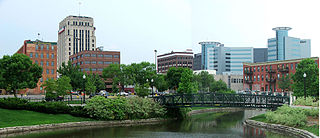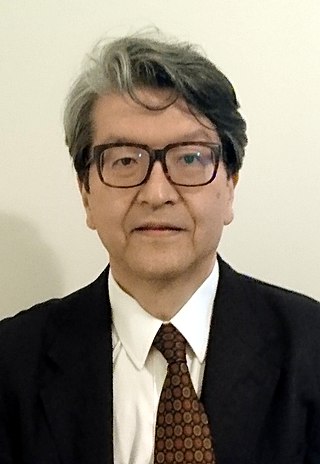In economics, a free market is an economic system in which the prices of goods and services are determined by supply and demand expressed by sellers and buyers. Such markets, as modeled, operate without the intervention of government or any other external authority. Proponents of the free market as a normative ideal contrast it with a regulated market, in which a government intervenes in supply and demand by means of various methods such as taxes or regulations. In an idealized free market economy, prices for goods and services are set solely by the bids and offers of the participants.

A market economy is an economic system in which the decisions regarding investment, production and distribution to the consumers are guided by the price signals created by the forces of supply and demand. The major characteristic of a market economy is the existence of factor markets that play a dominant role in the allocation of capital and the factors of production.

Kalamazoo is a city in the southwest region of the U.S. state of Michigan. It is the county seat of Kalamazoo County. At the 2020 census, Kalamazoo had a population of 73,598. Kalamazoo is the major city of the Kalamazoo-Portage Metropolitan Statistical Area, which had a population of 261,670 in 2020.
A mixed economy is an economic system that accepts both private businesses and nationalized government services, like public utilities, safety, military, welfare, and education. A mixed economy also promotes some form of regulation to protect the public, the environment, or the interests of the state.
Laissez-faire is a type of economic system in which transactions between private groups of people are free from any form of economic interventionism. As a system of thought, laissez-faire rests on the following axioms: "the individual is the basic unit in society, i.e., the standard of measurement in social calculus; the individual has a natural right to freedom; and the physical order of nature is a harmonious and self-regulating system." The original phrase was laissez faire, laissez passer, with the second part meaning "let (things) pass". It is generally attributed to Vincent de Gournay.
Economic interventionism, sometimes also called state interventionism, is an economic policy position favouring government intervention in the market process with the intention of correcting market failures and promoting the general welfare of the people. An economic intervention is an action taken by a government or international institution in a market economy in an effort to impact the economy beyond the basic regulation of fraud, enforcement of contracts, and provision of public goods and services. Economic intervention can be aimed at a variety of political or economic objectives, such as promoting economic growth, increasing employment, raising wages, raising or reducing prices, promoting income equality, managing the money supply and interest rates, increasing profits, or addressing market failures.
The social market economy, also called Rhine capitalism, Rhine-Alpine capitalism, the Rhenish model, and social capitalism, is a socioeconomic model combining a free-market capitalist economic system alongside social policies and enough regulation to establish both fair competition within the market and generally a welfare state. It is sometimes classified as a regulated market economy.
The nature of capitalism is criticized by left-wing anarchists, who reject hierarchy and advocate stateless societies based on non-hierarchical voluntary associations. Anarchism is generally defined as the libertarian philosophy which holds the state to be undesirable, unnecessary and harmful as well as opposing authoritarianism, illegitimate authority and hierarchical organization in the conduct of human relations. Capitalism is generally considered by scholars to be an economic system that includes private ownership of the means of production, creation of goods or services for profit or income, the accumulation of capital, competitive markets, voluntary exchange and wage labor, which have generally been opposed by most anarchists historically. Since capitalism is variously defined by sources and there is no general consensus among scholars on the definition nor on how the term should be used as a historical category, the designation is applied to a variety of historical cases, varying in time, geography, politics and culture.
Criticism of libertarianism includes ethical, economic, environmental and pragmatic concerns. With right-libertarianism, critics have argued that laissez-faire capitalism does not necessarily produce the best or most efficient outcome, and that libertarianism's philosophy of individualism and policies of deregulation fail to prevent the abuse of natural resources. Criticism of left-libertarianism is instead mainly related to anarchism. Left and right-libertarians also engage in criticism of each other.
The Anglo-Saxon model is a regulated market-based economic model that emerged in the 1970s based on the Chicago school of economics, spearheaded in the 1980s in the United States by the economics of then President Ronald Reagan, and reinforced in the United Kingdom by then Prime Minister Margaret Thatcher. However, its origins are said to date to the 18th century in the United Kingdom and the ideas of the classical economist Adam Smith.

Tyler Cowen is an American economist, columnist and blogger. He is a professor at George Mason University, where he holds the Holbert L. Harris chair in the economics department. He hosts the economics blog Marginal Revolution, together with co-author Alex Tabarrok. Cowen and Tabarrok also maintain the website Marginal Revolution University, a venture in online education.
Andrew Bernstein is an American philosopher. He is a proponent of Objectivism, the philosophy of Ayn Rand, and the author of several books, both fiction and non-fiction.
Right-libertarianism, also known as libertarian capitalism, right-wing libertarianism, or colloquially as libright, is a libertarian political philosophy that supports capitalist property rights and defends market distribution of natural resources and private property. The term right-libertarianism is used to distinguish this class of views on the nature of property and capital from left-libertarianism, a type of libertarianism that combines self-ownership with an egalitarian approach to natural resources. In contrast to socialist libertarianism, right-libertarianism supports free-market capitalism. Like most forms of libertarianism, it supports civil liberties, especially natural law, negative rights, the non-aggression principle, and a major reversal of the modern welfare state.
An economic ideology is a set of views forming the basis of an ideology on how the economy should run. It differentiates itself from economic theory in being normative rather than just explanatory in its approach, whereas the aim of economic theories is to create accurate explanatory models to describe how an economy currently functions. However, the two are closely interrelated, as underlying economic ideology influences the methodology and theory employed in analysis. The diverse ideology and methodology of the 74 Nobel laureates in economics speaks to such interrelation.

Humanistic capitalism is a concept that seeks to unite humanism, specifically the safety and health needs of people and the environment, with market forces and a market-based economy. It is often seen as a middle ground between the ideas of modern capitalism and democratic socialism.

Katsuhito Iwai is a Japanese economist and critic. He has studied the theory of money, macro dynamics, evolutionary economics, philosophy of corporations, fiduciary law, and the history of sociology. His work includes the book, Disequilibrium Dynamics, and many articles published in academic journals. He has also written books and articles in newspapers and magazines for the general public on a wide variety of subjects ranging from global capitalism, post-modernity, civil society, money and language to literature and movies. His keen observations and analysis of the works of Shakespeare, Marx, J. S. G. Boggs, and Ihara Saikaku have established him as one of the foremost essayists in Japan.
Inclusive capitalism is a theoretical concept and policy movement that seeks to address the growing income and wealth inequality within Western capitalism following the financial crisis of 2007–2008.
Economic democracy is a socioeconomic philosophy that proposes to shift ownership and decision-making power from corporate shareholders and corporate managers to a larger group of public stakeholders that includes workers, consumers, suppliers, communities and the broader public. No single definition or approach encompasses economic democracy, but most proponents claim that modern property relations externalize costs, subordinate the general well-being to private profit and deny the polity a democratic voice in economic policy decisions. In addition to these moral concerns, economic democracy makes practical claims, such as that it can compensate for capitalism's inherent effective demand gap.
A property-owning democracy is a social system whereby state institutions enable a fair distribution of productive property across the populace generally, rather than allowing monopolies to form and dominate. This intends to ensure that all individuals have a fair and equal opportunity to participate in the market. It is thought that this system is necessary to break the constraints of welfare-state capitalism and manifest a cooperation of citizens, who each hold equal political power and potential for economic advancement. This form of societal organisation was popularised by John Rawls, as the most effective structure amongst four other competing systems: laissez-faire capitalism, welfare-state capitalism, state socialism with a command economy and liberal socialism. The idea of a property-owning democracy is somewhat foreign in Western political philosophy, despite issues of political disenfranchisement emerging concurrent to the accelerating inequality of wealth and capital ownership over the past four decades.




